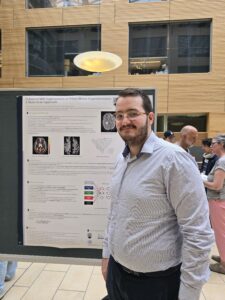Tarek Alkabbani is a current fourth-year Electrical Engineering student at UBC Okanagan working with Dr. Teresa Liu-Ambrose and Dr. Roger Tam as part of the SBME Synergy Undergraduate Summer Research Program. We caught up with Tarek to learn more about his experience in the program.
Why did you apply to the Synergy program?
The Synergy program provided a valuable opportunity to pursue my aspiration of conducting research. Having worked with Dr. Teresa Liu-Ambrose and Dr. Roger Tam for some time, we were eager to continue an important project we had been working on previously. The program also allowed me to connect with other aspiring researchers from diverse fields and disciplines, which was an enriching experience.
What is your research project?
Dr. Teresa’s lab, the Aging, Mobility, and Cognitive Health Lab, is part of the Canadian Longitudinal Study on Aging. This national study monitors and studies the health of Canadians across the country. Part of the work done in this study, is the initial processing of MRI scans for patients across Canada. This is a very tedious process that becomes exponentially harder in these large-scale studies. These studies can generate thousands of scans. One of the main processing tasks, is White Matter Hyperintensity (WMH) segmentation. WMHs are bright areas observed on MR scans and are strongly associated with neurodegenerative diseases and aging. Currently the segmentation task is still done manually. This requires radiology experts that must go through these 3D scans and paint each hyperintense voxel, with scans sometimes reaching 16 million voxels. This takes a lot of time and is a very expensive process. The goal of our project is to be able to create and deploy a practical automated pipeline that would relieve significant pressure on such large-scale studies. This pipeline relies on the latest developing breakthroughs in the world of deep learning and machine vision. The pipeline is designed around its practical implementation and deployment within the large-scale study.
What are some of the skills that you are learning in the lab?
 My project was highly self-directed, providing me with valuable experience in project management and the research process. I was responsible for developing the project’s details and design, which I discussed and refined with my supervisors. To generate new ideas, I stayed up-to-date with the latest work in the field and shared these approaches with my co-supervisor, Dr. Tam. He guided me in assessing their viability and helped implement the feasible ideas. The experiments we designed provided feedback, allowing us to iteratively refine the pipeline.
My project was highly self-directed, providing me with valuable experience in project management and the research process. I was responsible for developing the project’s details and design, which I discussed and refined with my supervisors. To generate new ideas, I stayed up-to-date with the latest work in the field and shared these approaches with my co-supervisor, Dr. Tam. He guided me in assessing their viability and helped implement the feasible ideas. The experiments we designed provided feedback, allowing us to iteratively refine the pipeline.
At times, I needed to acquire new techniques and skills to advance the project. This learning process was a novel experience for me, differing significantly from the structured approach of traditional coursework. It was self-directed and goal-driven, with each new skill developed in response to the research question at hand. This experience was invaluable in helping me grow as a researcher.
The technical skills I gained were focused on medical image processing and deep learning. I became proficient with a wide range of tools and frameworks, including PyTorch, MONAI, the ITK toolset, Slicer, NiBabel, ANTs, and more.
Another highlight of my experience was the networking opportunities that arose throughout the project. I connected with various experts at the DMCBH, deepening my knowledge and experience in MRI and medical imaging. One significant opportunity was attending the annual MRI retreat at DMCBH in June. This retreat was an incredible networking event where I met fellow researchers and industry professionals. The diverse talks at the retreat not only expanded my understanding of the field but also gave me insight into the work being conducted by researchers around me.
What are some accomplishments during your time in the program?
The project has made promising progress toward developing a practical pipeline, with positive results and metrics emerging from our experiments. However, there’s still a need to iterate further on our new ideas. Presenting at the poster session was also a rewarding experience. I was selected to participate in the trainee talks, where I had the opportunity to present to my cohort. It was exciting to see the work of my peers as well.
How has this experience changed your outlook on science or research?
This project, more than any previous research experience, truly put me in the driver’s seat of scientific inquiry. It deepened my understanding of how research differs from other types of work. In many fields, completing a task successfully is straightforward and often yields positive results. However, in research, even when everything is done correctly, the outcomes may not align with your expectations. This unpredictability is both the challenge and the beauty of research. It requires resilience, the ability to analyze your work critically, and the determination to push forward with new experiments or ideas.


